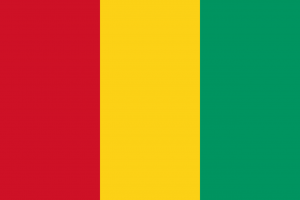Difference between revisions of "Language/Susu/Grammar/Object-Pronouns"
Jump to navigation
Jump to search
m (Quick edit) |
m (Quick edit) |
||
| Line 2: | Line 2: | ||
[[File:Susu-Language-PolyglotClub.png|thumb]] | [[File:Susu-Language-PolyglotClub.png|thumb]] | ||
Hello Susu learners, | Hello Susu learners, | ||
➡ In today's lesson you will learn how to form the Object Pronouns in Susu language. | ➡ In today's lesson you will learn how to form the Object Pronouns in Susu language. | ||
Happy learning! | Happy learning! | ||
The personal subject pronouns play the role of direct objet pronouns. | |||
<span link>Don't miss the chance to check out these pages as you wrap up this lesson:</span> [[Language/Susu/Vocabulary/How-to-Say-Hello-and-Greetings|Say Hello and Greetings in Susu]], [[Language/Susu/Grammar/Xili-To-be-called|Xili To be called]] & [[Language/Susu/Grammar/Tan|Tan]]. | |||
{| class="wikitable" | {| class="wikitable" | ||
|Number | |Number | ||
| Line 20: | Line 19: | ||
<nowiki>------------------------------</nowiki> | <nowiki>------------------------------</nowiki> | ||
N | N | ||
| Line 34: | Line 32: | ||
|- | |- | ||
| | | | ||
2nd person | 2nd person | ||
| | | | ||
I | I | ||
| | | | ||
Wo | Wo | ||
| Line 48: | Line 43: | ||
|- | |- | ||
| | | | ||
3rd person | 3rd person | ||
| | | | ||
A | A | ||
| | | | ||
E | E | ||
| Line 86: | Line 78: | ||
|} | |} | ||
== | ==Other Lessons== | ||
* [[Language/Susu/Grammar/To-have|To have]] | * [[Language/Susu/Grammar/To-have|To have]] | ||
* [[Language/Susu/Grammar/Xili-To-be-called|Xili To be called]] | * [[Language/Susu/Grammar/Xili-To-be-called|Xili To be called]] | ||
| Line 96: | Line 88: | ||
* [[Language/Susu/Grammar/Na-used-as-To-be|Na used as To be]] | * [[Language/Susu/Grammar/Na-used-as-To-be|Na used as To be]] | ||
* [[Language/Susu/Grammar/Possessive-Adjectives|Possessive Adjectives]] | * [[Language/Susu/Grammar/Possessive-Adjectives|Possessive Adjectives]] | ||
<span links></span> | |||
Latest revision as of 19:50, 27 March 2023
The Object Pronouns in Susu
Hello Susu learners,
➡ In today's lesson you will learn how to form the Object Pronouns in Susu language.
Happy learning!
The personal subject pronouns play the role of direct objet pronouns.
Don't miss the chance to check out these pages as you wrap up this lesson: Say Hello and Greetings in Susu, Xili To be called & Tan.
| Number | Pronouns | Objects |
| 1st person | Singular
------------------------------ N |
Plural
------------------------------ Muxu ------------------------------ Won |
|
2nd person |
I |
Wo |
|
3rd person |
A |
E |
Example for the verb kolon = know
| I n kolon? | Do you know me? |
| I a kolon ? | Do you know him? |
| N i kolon ? | Do I know you? |
| Muxu a kolon | We know him |
| Won e kolon | We know them |
| Wo n kolon | You (pl.) know me |
| E i kolon | They know you |
Other Lessons[edit | edit source]
- To have
- Xili To be called
- The subject pronouns
- Indirect object pronouns
- Past Tense
- Tan
- Imperative Mood
- Na used as To be
- Possessive Adjectives
